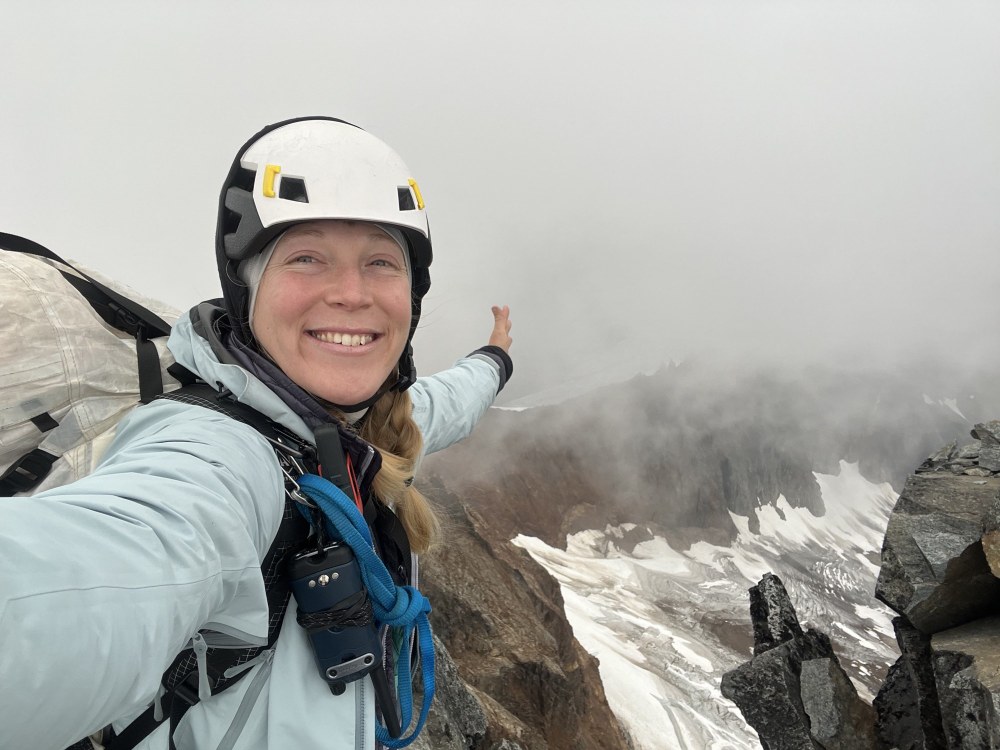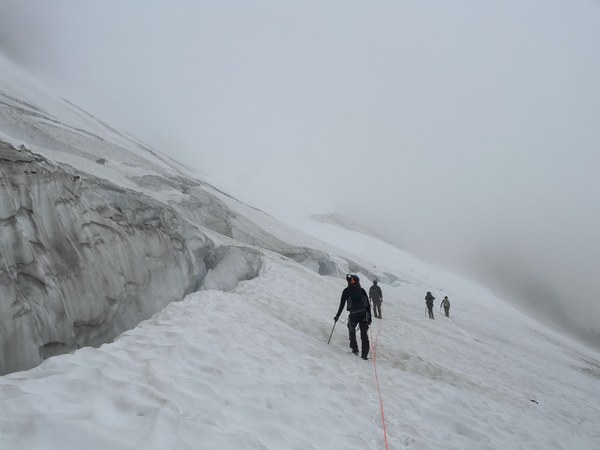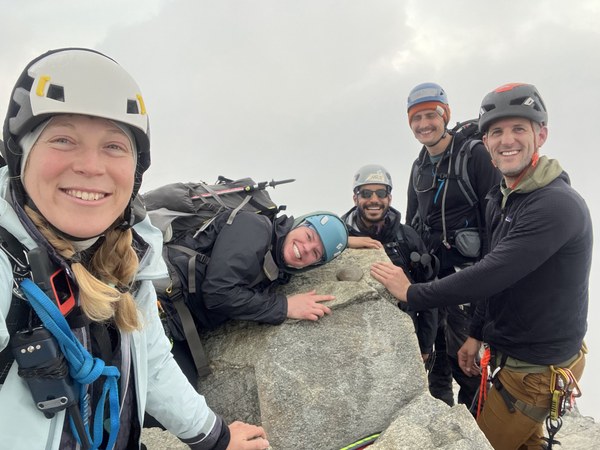
It's 9:30pm. I’m on a glacier, on a private climb with my Small Instructional Group (SIG). I joined the Basic Alpine Climbing course in December, and now we are out on one of the best climbs of my life. It’s been beautiful all day, with amazing views, great company, and a feeling of comradery. We are crawling across a glacier in swirling mist and smoke. The day’s warm weather has melted the top layer of the glacier, and the cool night air freezes it as we traverse. I am at the end of the rope, the last one to cross the glacier, and my crampons are skittering off the ice under my feet. Our climb is one misstep away from real danger. It will be a “near miss” if we make it off this steep slope, and it will be so much worse if I slip now.
Just one crampon point, one finger hold, one more step and I am off this blue ice. One more step to the end run. One more step off the stiff stuff and onto more friendly terrain. One more step and my team can stand up and uncurl from their arrest positions. One more step and we will all be able to breathe again. My SIG leader’s voice crackles through the whiteout, “Kelsey, one step at a time.”
Does he know how much those words mean to me? When I first started getting sober, it was one hour at a time, then one day, then a few weeks and months, and now years. One Step at a Time (OSAT) is the name of the climbing and sobriety organization that I am connected with. “One step at a time” is what I tell myself when things get challenging in the mountains, and now it's what my SIG leader is calling out to me in the dark.
I have six-and-a-half years of experience navigating the world sober, and I knew that the Basic course would challenge me in new ways. I knew that my greatest struggles would be learning to experience fear and joy on a climb without a celebratory shot, learning how to meet new people without a beer in my hand, and learning to trust my SIG without sharing a drink. Rather than keeping my sobriety a secret, I enlisted the support of my fellow Basic students. I hope that hearing my story will help others see the benefits of sharing their own stories, reaching out, and asking for support.
On our first SIG field trip, we met up in Vantage. After climbing The Feathers, we sat around the fire talking and getting to know each other. The beers came out, I begged off, said I was tired, and went to bed early, a personal “near miss.” I was excited about the folks in my SIG. Admitting that I can “climb hard routes” and that “I am an alcoholic” seemed way too much for a first field trip. Then there was the second field trip and the third, more near misses. Telling people “I’m sober” is hard, and it got harder the longer I went without saying it. Now, most of the group knows. I have been more open about my journey. I have talked about my sobriety and OSAT with the team. Most of all, I have experienced being supported by my SIG, cheering each other on as we climb Mount Si, checking each other’s knots before a rap, and sharing countless carpools. Being sober is about asking for help and admitting that I cannot do it on my own. I am not on my own in the mountains, and I am not on my own in my sobriety.
I'm roped to my SIG, each of us tethered by climbing harnesses to the person in front of us. We are a team of five, our leader at the front, followed by three of my fellow Basic students. The dark and dense fog around us makes the steep exposure of the ice below feel claustrophobic. After almost two hours of slow, desperate progress, I’m shaking from the effort of holding my ice axe with one hand and tiny ice ridges with the other. Each finger loses feeling as my gloves absorb the melted water. My left leg bounces in what rock climbers call the “sewing machine leg.” As I try to gain purchase with my crampons, I feel their metal edges glance off the slick surface of the glacier.
 Kelsey and team on the glacier next to a crevasse.
Kelsey and team on the glacier next to a crevasse.
“I’m going to fall, really fall, and you have to catch me,” I shout in the direction of our leader’s headlamp, knowing that catching me might mean the next person on the rope is pulled down, too. As the last person on the rope, if I slip, I will pendulum, gaining momentum as I rocket down the icy face of the glacier toward the crevasses below. When the slack runs out, the force of the fall will pull hard on my teammate, likely tearing him off the glacier. Our combined weight and speed might dislodge the whole team. My SIG is prepared to prevent this. They are face down on the glacier, ice axes pressed into the hard crust. Their crampons dig in, bodies braced for impact and ready to catch me before I go sliding into the crevasse. Compared to asking my team to catch a catastrophic fall, asking them to support me in my sobriety seems easy.
Joining The Mountaineers and being open about my need for support has been one of the best decisions of my sober life. Basic has taught me so many lessons, lessons I hope to pass along to others working through sobriety in The Mountaineers.
First, talking to my climbing partners about my sobriety early in our trips has made a difference. It is easier to focus on climbing when I’m not thinking about the post-climb beers. When I tell other Mountaineers that I am sober, sometimes they tell me that they are sober too. Sometimes they tell me that they are interested in becoming sober. Sometimes they just give me a hug and let me know they support me. Every conversation has been gracious. If you are struggling with your sobriety, talk to your climbing partners. They will have your back.
Second, I have learned to advocate for what I need. I know that I can relax around camp with birthday cake Oreos and hot cocoa. I know that I can enjoy summit naps instead of summit beers, climb volcanos and celebrate with smoothies. Asking for what you need is an opportunity for your team to get creative, problem-solve as a team, and invent ways of coming together that work for you.
Third, telling other climbers that I am sober helps keep me accountable, and accountability is critical to our continued sobriety. When my team knows that I am working to maintain my sobriety, they can support me. When I’m excited to celebrate after a great climb, I know I am safer when I am honest about my alcoholism. We are a team, and no one wants to see me slip.
Finally, to everyone working on sobriety in The Mountaineers, be proud of your accomplishments. Share your successes with your team. Whether you are counting days or counting climbs, it's about showing up for yourself like you show up for your rope team. As Mountaineers, we are in this together. Your sobriety makes my climb better, my sobriety makes our team safer. Be proud that you are doing the hard work of sobriety for yourself and your team.
As I step off the glacier, a palpable sense of relief passes through us all. A near miss. A ripple of laughter trickles through the group, along with the crinkle of zip-lock bags filled with candy and a big bear hug from the people who had my back. As we stumble, exhausted, back to the car, I feel grateful for this group of people who know me and love me for who I am: a sober Mountaineer.
 Kelsey and team at the summit of Mt. Sahale.
Kelsey and team at the summit of Mt. Sahale.
Add a comment
Log in to add comments.This is so helpful and inspiring! Your honesty helps us all!
Your writing is very impactful - as someone whose journey does not include sobriety work, it's really helpful to better understand your experience and your description of what a good, supportive teammate looks like.
 Kelsey Hoffman
Kelsey Hoffman